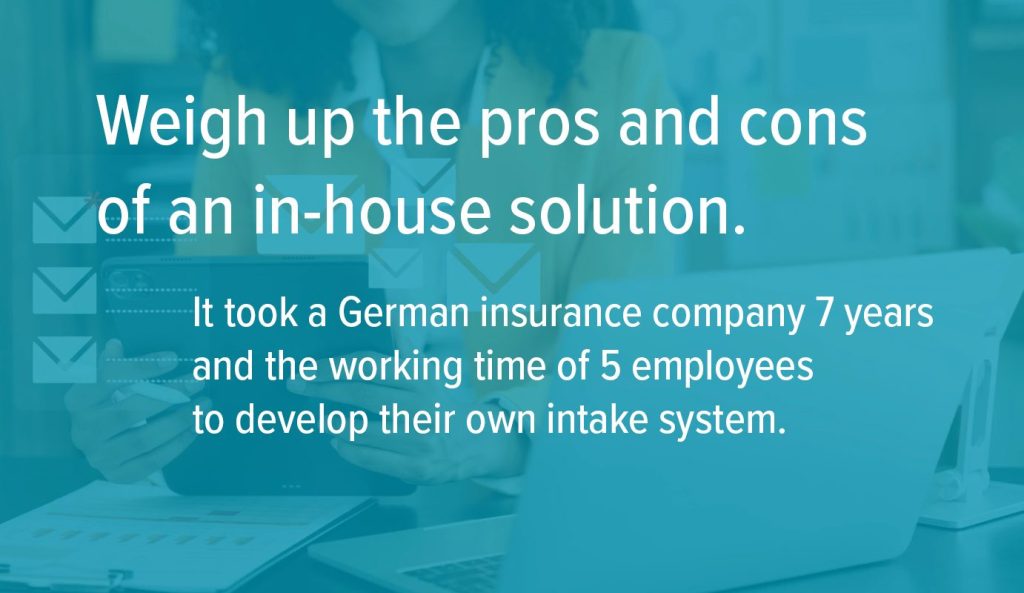Insurance companies are not immune to the hype surrounding generative AI. According to a Gartner survey, 70% of insurers plan to implement generative AI projects within the next three years. Numerous projects with large language models (LLMs) are being launched – all too often with an uncertain chance of success. This article explains how insurance companies can maximize the concrete benefits of AI projects
According to analyst firm Gartner, 46% of AI projects do not move beyond the pilot phase. Why is every second AI project abandoned before completion?
- Lack of trustworthiness (biases & hallucinations): Inaccurate, incomplete data sets lead to incorrect answers, and therefore wrong decisions, sometimes even discrimination.
- Concerns about security and data protection: LLMs offer only limited security when dealing with personal data and confidential information.
- Lack of AI experts: The AI field is developing rapidly. However, there is a lack of specialists who are sufficiently familiar with the topic. As a result, there are often years between test projects and operational solutions.
- Challenging integration with legacy systems: Legacy systems that have evolved over time make it difficult to integrate modern AI technologies.
- Difficulty in calculating a business case with a clear ROI: Many generative AI projects are launched without a concrete business case and tie up resources for a long time. Despite the high level of commitment, they often get stalled at an early stage.

What can insurance companies undertake to turn experimental AI projects into production-ready solutions that bring real added value to the organization?
- Ensure data quality: The output of AI systems is only as good as the input. The success of an AI project depends primarily on how clean and representative the data is that flows into model training.
- Focus on AI governance: Compliance with the AI Act and GDPR must be guaranteed. It is just as important to establish internal AI governance to define processes, control mechanisms and ethics. Best practice is to create a Center of Excellence for AI including cross-organizational stakeholders.
- Involve business and IT: The AI project must develop into a production-ready solution with added value for the organization – that’s why you need to involve business users from the beginning. They will help you build a business case with measurable added value. You must also involve your IT experts to ensure the proper integration of the solution into the existing enterprise software architecture.
- Assess the technology fit: First, you should conduct a market survey to identify the technologies required to address the use case in its entirety. A combination of generative AI, machine learning and natural language processing is usually necessary to achieve the best results. In the next step, draw up a list of AI tools and vendors and evaluate them. The project architecture should be designed using a combination of internal and external resources to achieve optimal cost-effectiveness.
- Weigh up the pros and cons of an in-house solution: Only develop applications in-house where a high level of in-house expertise and customization is required, or when singularity provides a strong competitive advantage. The time frame for in-house applications can be several years – for example, a German insurance company invested 7 years and the working time of 5 employees to develop its own input management system.
- Leverage external expertise: In many cases, instead of experimenting with raw AI algorithms, it is advisable to draw on the expertise of AI software companies that have already gone through the experimental phase and offer a ready-made, tested, scalable solution.
We, at Cortical.io, have developed a semantic AI software that has been successfully supporting companies in the insurance industry in automating document-centric processes for several years.
For example, we have been helping several US insurance companies to automate labor-intensive processes such as customer intake and quote submission. The information that is important for further processing is extracted from policies and incoming inquiries with a very high degree of accuracy, before being classified and compared. This increases productivity and enhances the satisfaction of customers and employees.
 This track record has recently enabled a strategic alliance with Swiss Re, a leading global reinsurance company. Cortical.io’s IDP solution SemanticPro is offered to Swiss Re’s clients in the US to accelerate the intake process and improve the efficiency of quote preparation. Post implementation, the solution’s intelligent extraction and classification capabilities have proven to reduce review time by up to 30% and increase quote accuracy by 17% compared to manual processes.
This track record has recently enabled a strategic alliance with Swiss Re, a leading global reinsurance company. Cortical.io’s IDP solution SemanticPro is offered to Swiss Re’s clients in the US to accelerate the intake process and improve the efficiency of quote preparation. Post implementation, the solution’s intelligent extraction and classification capabilities have proven to reduce review time by up to 30% and increase quote accuracy by 17% compared to manual processes.
“The insurance industry grapples with legacy systems, manual workflows and siloed data that hinder operational efficiency. We quickly realized that one of the areas where we could add value was in helping our clients adopt automation and integrate AI-driven tools that streamline their processes and increase efficiency,” said Chris Howley, Head of Group Life & LTD Reinsurance & Vice President, Americas at Swiss Re. “Among the IDP vendors we evaluated, Cortical.io stands out for its ability to accurately process complex provisions and its user-friendly, no-code interface. I look forward to contributing to our clients’ business success through this collaboration.”


